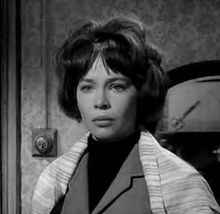fiction.wikisort.org - Movie
The L-Shaped Room is a 1962 British kitchen sink drama film directed by Bryan Forbes, based on the 1960 novel of the same name by Lynne Reid Banks.[2] It tells the story of Jane Fosset (Leslie Caron), a young French woman, unmarried and pregnant, who moves into a cheap London boarding house, befriending a young man, Toby (Tom Bell), in the building.[3][4] The work is considered part of the kitchen sink realism school of British drama.[5][6]
| The L-Shaped Room | |
|---|---|
 Theatrical release poster | |
| Directed by | Bryan Forbes |
| Screenplay by | Bryan Forbes |
| Based on | The L-Shaped Room by Lynne Reid Banks |
| Produced by |
|
| Starring | |
| Cinematography | Douglas Slocombe |
| Edited by | Anthony Harvey |
| Music by | John Barry |
| Distributed by | British Lion Films |
Release date |
|
Running time | 126 minutes |
| Country | United Kingdom |
| Language | English |
| Box office | $1 million (US/Canada rentals)[1] |
Caron's performance earned her the Golden Globe Award and BAFTA Award for best actress, as well as a nomination for the Academy Award for Best Actress.[7][8][9]
Synopsis
A 27-year-old French woman, Jane Fosset (Caron), arrives alone at a run down boarding house in Notting Hill, London, moving into an L-shaped room. Beautiful but withdrawn, she encounters the residents of her house, each a social outsider in his or her own way, including a gay black horn player.[2]
Jane is pregnant and has no desire to marry the father. On her first visit to a doctor, she wants to find out if she really is pregnant and consider her options. The doctor's facile assumption that she must want either marriage or an abortion insults her to the extent that Jane determines to have the child. She and Toby (Bell) start a romance, which is disrupted when he learns that she is pregnant by a previous lover. They try to work things out, but he is also unhappy with his lack of income or success as a writer.
Jane befriends the other residents and they help her when she goes into labour. Toby visits her in the hospital and gives her a copy of his new book, called The L-Shaped Room. After leaving the hospital, Jane journeys home to her parents in France, saying goodbye to the room where she has lived for seven months.
Cast
- Leslie Caron as Jane Fosset
- Tom Bell as Toby
- Brock Peters as Johnny
- Cicely Courtneidge as Mavis
- Bernard Lee as Charlie
- Patricia Phoenix as Sonia
- Emlyn Williams as Dr. Weaver
- Avis Bunnage as Doris
- Gerry Duggan as Bert
- Mark Eden as Terry
- Antony Booth as youth in street
- Harry Locke as newsagent
- Gerald Sim as doctor in hospital
- Nanette Newman as girl at end
Music
Peter Katin's recording of Johannes Brahms's Piano Concerto No. 1 in D minor, Op. 15 is used as the background music, and excerpts occur frequently throughout the film.[4] The original film score was composed by John Barry.[10]
Popular culture
A recording of the song "Take Me Back to Dear Old Blighty" sung in the film was sampled at the beginning of the title track of the album The Queen Is Dead by The Smiths.[11]
Critical reception
In The New York Times, Bosley Crowther wrote "[Leslie Caron] pours into this role so much powerful feeling, so much heart and understanding, that she imbues a basically threadbare little story with tremendous compassion and charm.The credit, however, is not all Miss Caron's. She must share it with an excellent cast, including Tom Bell, a new actor who plays the writer on a par with her. Particularly she must share it with the remarkable young director Bryan Forbes, who also wrote the screenplay from a novel by Lynne Reid Banks. Mr Forbes is a sometime actor whose first directorial job was last year's beautiful and sensitive Whistle Down the Wind. In this little picture, he has achieved much the same human quality, with shadings of spiritual devotion, as in that."[6]
Awards
- Nominee, Best Actress – Academy Awards (Leslie Caron)
- Winner, Best Actress – Golden Globes (Leslie Caron)
- Winner, Best Actress – BAFTA (Leslie Caron)
- Nominee, Best Picture – BAFTA (Richard Attenborough, Jack Rix, John and James Woolf)
- Selected, Top Ten Films of Year – National Board of Review
- Nominee, Best Actress – New York Film Critics Circle (Leslie Caron)
References
- "Top Rental Features of 1963". Variety. 8 January 1964. p. 71.
- Benn, Melissa (27 September 2010). "The L-Shaped Room". New Statesman. Retrieved 3 June 2018.
- "BFI Screenonline: L-Shaped Room, The (1962)". Screenonline.
- "The L-shaped Room (1962)". British Film Institute.
- "Where to begin with kitchen sink drama". British Film Institute.
- Crowther, Bosley (28 May 1963). "Screen: 'L-Shaped Room':Leslie Caron Grows Up in Harsh Story". The New York Times.
- "BAFTA Awards". awards.bafta.org.
- "Leslie Caron". www.goldenglobes.com.
- "The L-Shaped Room (1962) - Bryan Forbes - Awards". AllMovie.
- "The L-Shaped Room (1962) - Bryan Forbes - Cast and Crew". AllMovie.
- Haworth, Catherine; Colton, Lisa (3 March 2016). Gender, Age and Musical Creativity. Routledge. ISBN 9781317130055 – via Google Books.
External links
- The L-Shaped Room at IMDb
- The L-Shaped Room at AllMovie
- The L-Shaped Room at the BFI's Screenonline
Другой контент может иметь иную лицензию. Перед использованием материалов сайта WikiSort.org внимательно изучите правила лицензирования конкретных элементов наполнения сайта.
WikiSort.org - проект по пересортировке и дополнению контента Википедии
